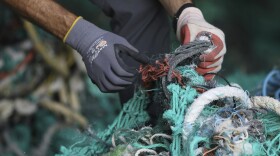Hawai?i's threatened plants and animals could be impacted by the new changes to federal wildlife conservation rules, particularly those edging toward but not yet endangered.
The Department of Interior announced this week a list of revisions to the Endangered Species Act. Interior Secretary David Bernhardt says the changes will help conservation efforts, and increase transparency about the law.
Officials say these changes will only apply to future listing decisions.
A third of Hawai?i's native birds and plants are on the endangered species list. Disease, predators and diminishing habitats could push more species into that category, experts say. The state is sometimes referred to as the endangered species capital of the world.
Critics say there are several troubling aspects to the revisions, especially since a recent report from the United Nations found as many as a million species are at risk of extinction -- many within decades.
One of the revisions would lessen the protections for species that are threatened, which is a step before they're considered endangered.
"Those species that are threatened often are in a better position to benefit from protective measures," says Sam Gon, senior scientist and cultural advisor with The Nature Conservancy's Hawai?i Chapter.
Another change receiving criticism is the economic considerations being implemented in designating threatened and endangered species. Conservationists fear the needs of businesses and corporations may outweigh the biological needs of these species.
"I think any revisions that make it harder to list species or bring in destructing influences suggest it will be more difficult to list species, which means it'll be more difficult to bring protective measures into play," Gon says.
"That has a tendency to erode the ability to work with those species that are declining as a result of development or climate change or various other things that are becoming more and more prevelant."
However, Gon believes there is at least one revision that could be beneficial in protecting endangered or threatened species in the islands. The change calls for more collaboration on recovery efforts among federal agencies.
"Right now, federal agencies tend to look at the Department of Interior and Fish and Wildlife Service as the 'go-to' for endangered species considerations," said Gon. "But we do know that working together is the best way to do it."
Gon cites the military's conservation efforts in Hawai?i as an example. He says the military works very closely with other federal agencies to protect native endangered species in training areas, and it has led to some very well-funded programs for protection efforts.
And Gon says many have benefited from the protections the Endangered Species Act provides. But he warns that any change to the act will have ramifications for the state.
"Anytime there are changes to the law, it's always difficult to see, clearly, exactly what the ramifications of those changes will be," said Gon. "I think it's time to be more aggressive in advancing our efforts to protect endangered and threatened species, and not watering down any of the efforts."




